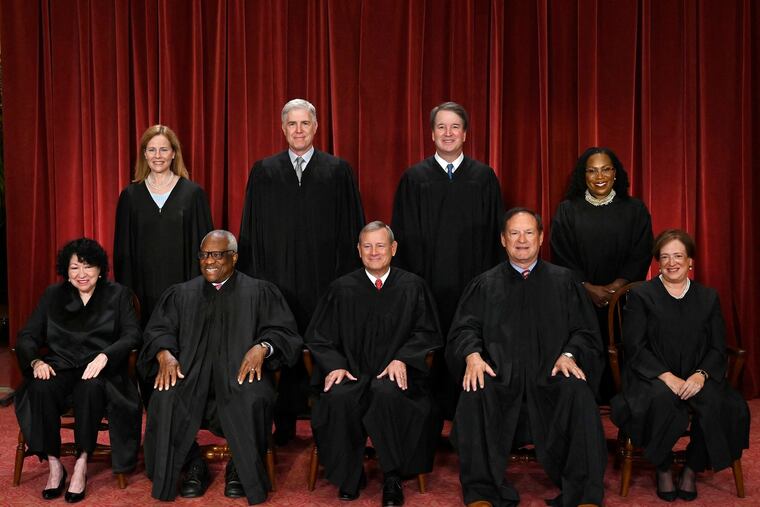Supreme Court could drop ‘wrecking ball’ on another legal precedent
As Black students in law school, we’re concerned that SCOTUS could dismantle affirmative action at a time when students of color remain at significant disadvantage.

As Black students in law school — a field that remains one of the least diverse in the country — the role of race in higher-education admissions is never far from our minds. This reality is why we are particularly concerned about the latest Supreme Court term.
In the next few months, the court is set to take another wrecking ball to its legal precedent. This time, the court is poised to undermine its rulings that have helped level the playing field for Black students and other students of color.
On Oct. 31, the court will hear arguments for two cases that challenge the constitutionality of using affirmative action in the admissions process at colleges and universities. The cases, Students for Fair Admissions v. President and Fellows of Harvard College and Students for Fair Admissions Inc. v. University of North Carolina, could fundamentally reshape the landscape of higher education and limit social mobility for students from marginalized communities.
They could also unravel years of legal precedent.
» READ MORE: Supreme Court affirmative action case pretends we haven’t already wrecked Black college access | Will Bunch
In 2003, the court determined that the U.S. Constitution allows affirmative action in college admissions, permitting schools to consider race while assessing students’ applications. The court, however, observed that schools are only allowed to use race as one of many factors colleges and universities consider when evaluating a student’s application.
In early 2022, the court agreed to hear the potentially paradigm-shifting challenge brought by Students for Fair Admissions, an organization with (in our opinion) a misleading name and vision. The group’s efforts, if successful, would eradicate race-conscious college admissions processes that seek to increase access to higher education for Black students and other students of color.
Affirmative action is not a panacea for remedying systemic racism. But its goal is to help level the playing field for marginalized students. Despite all the nation’s efforts, Black students remain at a significant disadvantage when it comes to college admissions.
Black students remain at a significant disadvantage when it comes to college admissions.
Just consider Philadelphia, where Black students make up the majority of the students in the School District of Philadelphia. The district, however, is, according to some education advocates, underfunded relative to other school systems in the state by more than $1.1 billion — or more than $5,500 per student. That disparity can make it harder for its students to succeed in the classroom — and, ultimately, while applying to colleges. The typical student from nearly any another Pennsylvania district — who is most likely white — has almost certainly received a better high school education than a Philadelphia student, and thus has an advantage when applying to college.
This reality is on display in school districts nationwide, and has vast ramifications for our society.
Without affirmative action, generational wealth, familial ties, and legacy preferences would play an even greater role in college admissions than they already do. This would put the most selective schools out of reach of many Philadelphia residents of color who are living below the poverty line, lack resources, and are unable to access the kind of networks and connections that can give them a leg up in admissions. The Supreme Court’s prohibiting race-conscious admissions would, in effect, hinder the success of students from school districts that are severely underfunded and have yet to adequately reckon with the lasting consequences of racial and economic school segregation.
It goes without saying that affirmative action also affects graduate and professional degree programs, including law schools, and we don’t want to see our classrooms become less inclusive than they already are.
If the Supreme Court declared affirmative action unconstitutional, it would tear at the very foundation of our society. Such a decision would make it more difficult for Black students and other students of color to enter their preferred professions. And the white students who will likely continue to occupy disproportionate space in those fields could have an even harder time understanding the lives of people who do not look like them — arguably, a requisite qualification for good leaders in any field.
With the Supreme Court dominated by an ultraconservative supermajority that includes Justice Clarence Thomas — a noted opponent of race-conscious admission policies — the future of affirmative action, and our society, is dire.
The crusade to end affirmative action is both misguided and dangerous. If the Supreme Court is truly guided by the principles of justice and equity, it will uphold the legitimacy of affirmative action. Anything else would be a travesty.
Devontae Torriente and Ty Parks are students at the University of Pennsylvania Carey Law School and the advocacy cochairs for the Penn Black Law Students Association.